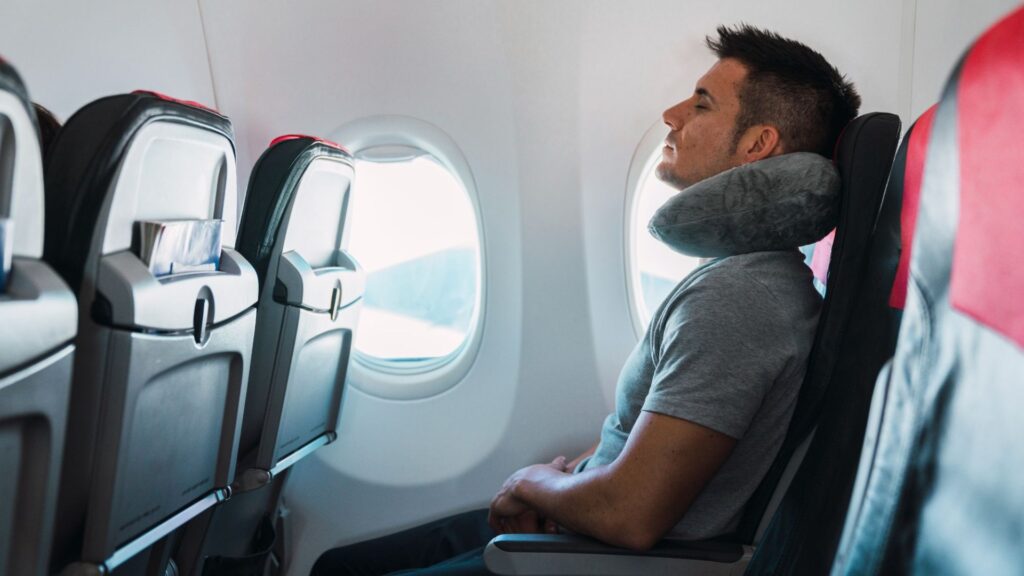A gastroenterologist has revealed why you get bloated when you fly – and it's not your fault.
Boarding a plane to your next destination is always a fun moment, but many passengers often experience certain problems.
A day of air travel can have a negative impact on your digestive system, causing gas, bloating, and the need to release pressure.
People with irritable bowel syndrome especially suffer the most.
However, this process is completely normal, so there's no need to panic if your waistband starts to feel tight after takeoff.
However, understanding the causes of these symptoms will help you better overcome them in the future.
Dr. Melissa Hirschman, a gastroenterologist at Oregon Health and Science University, revealed that the normal amount of gas in the stomach and intestines expands when cabin pressure drops.
This is similar to what happens to potato chip bags and plastic water bottles, added Dr. Baha Mosily, a gastroenterologist at Atrium Health Wake Forest in Charlotte, North Carolina.
“High altitude also seems to slow down the contractions of the muscles that keep the contents of the digestive system moving,” Dr. Moshily told the New York Times.
“Experts don't know why this happens,” she added.
Nevertheless, this is one of the reasons why you may feel constipated on the day of your air travel.
If your intestines aren't feeling well, you can also accumulate more gas.
Sitting for hours on end during a long flight won't help, so Dr. Hirschman suggests doing some physical activity, like walking, to keep your gastrointestinal tract “moving.”
Megan Leal, a gastrointestinal psychologist at Michigan Medicine, said the stress and anxiety of traveling can also make gas and bloating worse.
However, there are limits to the movements you can make during flight, and you cannot change the plane's altitude or barometric pressure.
But if flying leaves you feeling gassy and bloated, our experts can advise you on your next trip.
“Watch what you eat,” says Tamara Duker Froeman, a New York City nutritionist who specializes in digestive disorders. “Avoid foods known to cause gas the day before you leave.” he said.
She urged passengers to avoid high FODMAP foods such as beans, onions, garlic, wheat, certain nuts, dairy products and fruit.
Dr. Froeman also said that coffee should not be consumed as it has a bad reputation for causing dehydration.
Staying hydrated is key to avoiding constipation, which can worsen gas and bloating, says Dr. Moshily.
She said the best way to avoid this problem is to bring a refillable water bottle so you have water throughout the day.
It's also helpful to avoid alcohol the day before and the day of your trip, as it can cause dehydration.
Carbonated drinks can also make gas symptoms worse, but in some people they may help burp and reduce gas buildup.
Dr. Hirschman encourages the use of medications and supplements as needed, and over-the-counter medications such as Gas-X and Mylanta are best taken before a flight.
Another option is to try enzyme supplements like Beano or Fodzyme before meals. This may help reduce gas produced by digestion, she added.
People often chew gum to relieve ear discomfort during flights, but they can also cause you to swallow more air.
Hirschman said passengers were advised to avoid chewing gum or at least limit chewing if they were concerned about bloating.
But the best treatment for reducing bloating and gas buildup is physical activity.
“Move your body. If possible, get up from your seat every hour,” says Froeman.
“Try finding space to reach your toes and twisting your midsection from side to side.
“These movements can help gas spread throughout the intestines instead of staying in one place,” she said.
Breathing techniques are also an option.
“If you remain seated, diaphragmatic breathing can help reduce stress and relax your bowels,” Dr. Leal says.
Passengers breathe in through their nose for 4 seconds and exhale through their mouth for 6 seconds until they feel their stomach flatten.
In the worst case scenario, “leave me alone.”
“If gas is causing you pain or discomfort, holding on to it will make you feel even worse,” Dr. Leal says. “It's healthy to go outside.”
“Trust me, you're not the only one farting on airplanes,” she said.


